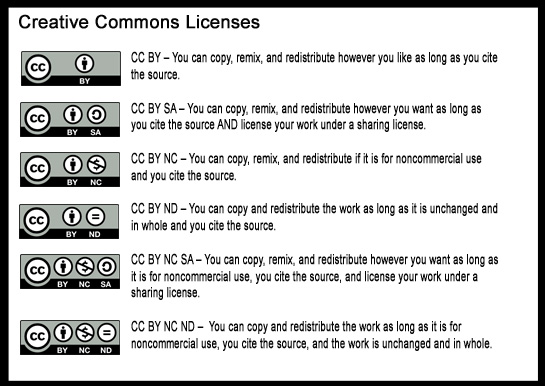 by Karen Fasimpaur
by Karen Fasimpaur

This work is licensed under a Creative Commons Attribution 3.0 Unported License.
(printable pdf version of this article)
Good citizenship is not just about things that participants in a society shouldn’t do, but also about what we should do. As members of a well-functioning community – whether physical or digital – we are called upon participate in governance, be courteous toward one another, and thoughtfully share certain community resources. In the physical world, our necessarily shared resources include land, air, and water. The digital parallels include bandwidth and data.
Beyond those things that we must share, there are commodities that we may opt to share, whether out of generosity or other motivations. One key difference in the digital world though, is that we can still retain personal ownership of what we share by virtue of perfect digital copies. Sharing comes very naturally in the networked world (some might argue that we share too much) through social networks, email, messaging, photo and video sharing sites, and thousands of other opportunities to create and share content online.
While many of us post to these sites with the intention of sharing, current copyright laws limit the extent of that sharing. Legally, others are prevented from fully sharing, downloading and using such materials in a presentation, for example, without permission from the creator. (There are some exceptions to this in terms of fair use, but the law is gray especially if the resulting work is to be published online. Suffice it to say that fair use is not as broad as many think it is. Also fair use applies almost exclusively only in the U.S., which poses challenges in the globally connected online world.) These restrictions of copyright stand in stark contrast to the technical ease with which these materials can be reused. Just think about the simplicity of copying and pasting, and the frequency with which it is done without regard to copyright or digital citizenship.
For those who want to share their digital content more fully without requiring others to request permission, there are the Creative Commons (CC) licenses, which preserve the ownership and copyright of the creator while simultaneously saying to others, “It’s ok to use my stuff without asking my permission as long as you attribute me as the creator.” There are a variety of CC license that extend different degrees of sharing rights, for example, non-commercial use. See the box below and the Creative Commons web site for a complete explanation.
Educators have a long history of sharing. We have always shared lesson plans, exchanged assignments, and traded teaching and learning strategies in order to enrich learning for all of our students. Now in the digital realm, we can extend this by applying a CC license to the educational materials we create that we are willing to share.
As educators, we are compelled not only to exhibit good digital citizenship ourselves, but also to help our students learn about digital citizenship, including the meaning of copyright, the associated legalities, and other licensing options like Creative Commons. Students are incredibly engaged and inquisitive about topics like these, in part because they view themselves as content creators and copyright owners.
Finally, we should help students understand the common good that can come from sharing. In the era of uber-collaboration, they will need these skills in the workplace. Students should be challenged to think about the detriments of online vandalism and other behavior that not only harms collaboration but can destroy content that others have selflessly shared.
We should all be mindful of the benefits of sharing under licenses like CC and how much value we can add to others without decreasing our own digital net worth. Sharing like this could not only revolutionize education but it could change the world.
Open Educational Resources
Here are just a few of the many open-licensed educational resources that are available.
CK-12 FlexBooks
Open textbooks that can be flexibly configured (high school)
Curriki
A repository of educational resources covering all subjects (K-12)
FreeReading
A research-based reading intervention program (elementary)
Khan Academy
(also available in Curriki)
Over 2,100 videos and 100 exercises in math and other topics
Kids Open Dictionary
Accessible definitions and glossaries that can be imported into lessons or online courses
PhET
Interactive math and science simulations (middle and high school)
Open High School of Utah
Downloadable Moodle courses in a variety of subjects (high school)
P2PU
Open, online, peer learning about almost anything, now with a School of Ed for professional development


